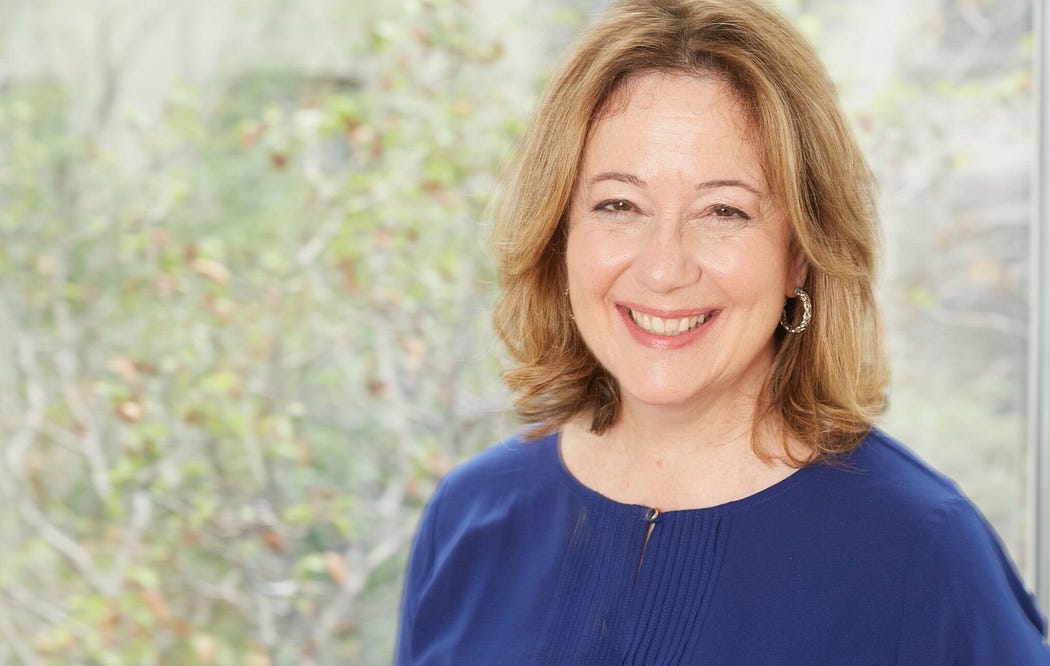As part of my series about the “5 Things You Need To Know To Survive And Thrive After A Divorce” I had the pleasure of interviewing
Jean Fitzpatrick LP. Jean is a licensed relationship therapist in New York City who works with c
ouples and individuals. For over 20 years she has helped New Yorkers nurture stronger, more loving relationships or create a graceful path to growth and recovery after a divorce or breakup.
Jean’s practice includes leaders in finance, fashion, entertainment, medicine, and other demanding fields where without careful planning, long hours and travel can wreak havoc on a relationship. Jean often works with New York’s expats — the international residents who have come to work in the city’s big firms, research centers, and the United Nations and whose relationships reflect a mosaic of cultural values and experiences.
She also specializes in helping people who identify as “highly sensitive,” because they process emotions and events deeply, are aware of subtleties, and are easily overstimulated — about 15 to 20 percent of the population at large, but probably higher in Manhattan, a magnet for the creative and gifted.
Thank you so much for doing this with us! Can you tell us a story about what brought you to this specific career path?
I was originally trained and licensed as a psychoanalyst. Then around twenty years ago people began asking me if they could bring their spouse or partner to improve their relationship. Instantly I knew I loved couples work for its liveliness and for the ability to create big changes in a relatively short time. Couples therapy demands a lot from the therapist, who does active coaching in the face of high-stress conflict. A colleague described it as landing a helicopter in a hurricane. Fortunately, my psychoanalytic training had included couples work, but it was exciting to do a deep dive into cutting-edge research on what helps couples. I’m still exploring and learning every day.
Right now attachment theory is very popular in the couples therapy community. Therapists use attachment theory to understand the styles of emotional bonds people develop starting in childhood. Some of the earliest research on attachment came from John Bowlby and D.W. Winnicott, who studied the impact on London children when they were sent away to live in the countryside, safe from the London blitz. Bowlby and Winnicott were both psychoanalysts, so with couples therapists learning from psychoanalysis these days, I feel as though I’ve come full circle.
Can you explain to our readers why you are an authority about “divorce”?
That’s a paradox, because for years I’ve belonged to a group called Marriage Friendly Therapists. I’m committed to giving couples the tools and support they need to repair and rebuild their marriage. I’m the last person in the room to give up hope.
Sometimes, though, one partner in a relationship gives up. And then, as a divorce moves forward, both partners are dealing with tremendous change and loss. The divorce is the end of the marriage and also the death of the hopes and dreams they brought into it. Often they ask me to I do divorce counseling with one or both partners to help them manage their grief and anger as they experience this tremendous change. With professional help and support, they can navigate the divorce constructively.
Can you share the most interesting story that happened to you since you started this?
Here in New York there are so many opportunities to help partners understand and accept each other’s different perspectives, cultures, and life experiences. My work is confidential, of course, but I can disguise the details and tell you about a couple who were planning a family gathering and disagreeing about everything from the venue to the menu. The wife — I’ll call her Priya — a physician from India, was trying hard to please her devout, wealthy Hindu family. They had dietary restrictions but also particular views on how the event should happen in terms of the level of formality, seating, and so on. The husband — let’s call him Paolo — was an Italian restaurateur who just wanted everybody to sit around a big table and enjoy the food.
As the planning wore on, Paolo grew increasingly frustrated. “But Priya!” he said finally, pressing his hands together and shaking them in that prayerful-looking ItalIan gesture of frustration. “You only live once!”
His wife’s jaw dropped. “Paolo,” she said quietly, “nobody in my family believes that.” Fortunately, they were able to share a good laugh — not out of disrespect for her family’s beliefs, but because they were having a moment of recognizing that to connect in a loving way demands that we acknowledge our differences, which are so easy to forget.

If you had a close friend come to you for advice after a divorce, what are 5 things you would advise in order to survive and thrive after the divorce? Can you please give a story or example for each?
- Don’t sign up for Match.com and get discouraged. You are probably not ready. Give yourself time to rediscover yourself when you’re not under the massive stress of the divorce. Learn a new sport or hobby and connect with some new friends who enjoy it too.
- Avoid letting well-meaning friends boss you around. Often they’ll encourage you to date but warn you against getting serious with anybody. Confusing, right? Learn to listen to your own inner wisdom: try journaling and talking to one person you trust not to give unsolicited advice, whether it’s a therapist or a family member or friend who is a respectful listener.
- Know that the way things are with your ex now isn’t permanent. Let the post-divorce relationship with your ex develop over time. If your conflicts are explosive right now, keep your distance. Over time, tough, I have seen couples forge a friendship they never managed to create during the marriage.
- Forget “winning the divorce.” Focus instead on practicing self-compassion. Even if your ex finds a new spouse, or if several friends defect to his or her side, you are doing the best you can. You’ll find your own path.
- You’re not a failure! Every divorcing person I’ve ever worked with has told me at some point that they felt like one. The whole shape of their everyday life and future have changed in a way they didn’t expect and didn’t sign up for. You’re not alone. But every life has its setbacks. It’s what you do with them that counts. Let the divorce teach you.
What are the most common mistakes people make after they go through a divorce? What can be done to avoid that?
They bring their emotions into the settlement negotiations. All that does is prolong the misery. They may hope that their soon-to-be-ex will understand how hurt they are, or decide that it’s payback time. These are not practical strategies. Individual therapy during divorce proceedings can be an opportunity to come to terms with the pain, to deal with the anger, and to move forward to building the life you want.
Do you have any favorite books, podcasts, or resources related to this topic that you would recommend to our readers?
I Wish I Knew This Before My Divorce by Elaine Foster and Joe Foster.
Can you please give us your favorite “Life Lesson Quote” that helped you in this work? Can you share how that was relevant in your real life?
“Don’t demand respect. Command respect.” I remember seeing these words on a sidewalk sandwich board outside a Marines recruitment office when I was a young child just learning to read. I didn’t really understand them until decades later. I find that often women ask for validation or approval from the men in their life. This is really tough if you’re going through a breakup or divorce, when your man has become an ex who dismisses or directly opposes you and your narrative in many painful ways. Commanding respect means you stop looking to change. Instead you practice having the courage to be authentic and to find ways to validate yourself.
When we practice hitting pause instead, we hold space for ourselves to calm down and get clear about our best next step.
Are you working on any exciting new projects now? How do you think that will help people?
Right now I’m exploring various ways one particular character trait can transform an angry conversation and breathe new life into a stale connection. Everyone is born with this trait but too often we neglect to recognize its value to our relationships and miss out on so many opportunities to turn things around. I won’t name the trait here but welcome inquiries!
Because of the position that you are in, you are a person of great influence. If you could inspire a movement that would bring the most amount of good to the most amount of people, what would that be? You never know what your idea can trigger. 🙂
Know when to hit pause. Too often we react instantly when we’re hurt or offended. The result is a spiraling into anger and disrespect that escalate conflict and only bring out the worst in everyone involved. Couples therapists see this every day in our offices. We all hear it on tv talk shows. And by now it’s a familiar pattern in tweets from the Oval Office. Hair trigger reactions are dragging down our whole discourse, public and private. When we practice hitting pause instead, we hold space for ourselves to calm down and get clear about our best next step.

Some of the biggest names in Business, VC funding, Sports, and Entertainment read this column. Is there a person in the world, or in the US with whom you would love to have a private breakfast or lunch with, and why? He or she might just see this if we tag them 🙂
Amal Clooney is such an interesting, complex person: an articulate human rights advocate, an elegant woman very much in love, and — like many of the people in my practice — a mother in a partnership marriage. Breakfast or lunch with her sounds intriguing, especially in Lake Como. And George can come too!


